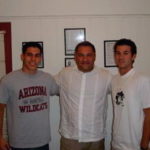Lisa Bauch doesn’t like being told “no.” The owner of Uppercut Boxing Gym, in Minneapolis, MN, found other boxing gyms to be unwelcoming to a woman entering the sport; Lisa rectified this problem by starting her own gym. Now in its eleventh year of operation, Uppercut welcomes all boxing enthusiasts, from fighters in training, to casual exercisers. Lisa has long sought to “demystify” boxing so that many can enjoy the fitness and confidence it provides. Lisa, who fell for boxing while learning self-defense, still faces the prejudice inherent to a male dominated world, but she lets her fighters speak in the ring.
 When asked where boxing and business collide, Lisa conjures a boxer who has lost the first round. Sitting in the corner, beaten and tired, that fighter must “look for the angles and take a different approach,” even in the face of a terrible start. It is this kind of resilience that allows Uppercut to thrive, while “simply allowing more people to be involved with the sport.” Lisa, whose 43 years are not evident in her face, knows that when the bell rings, it’s “back to basics.” Uppercut continues to be a place to hone these basics, even if you are not looking to fight.
When asked where boxing and business collide, Lisa conjures a boxer who has lost the first round. Sitting in the corner, beaten and tired, that fighter must “look for the angles and take a different approach,” even in the face of a terrible start. It is this kind of resilience that allows Uppercut to thrive, while “simply allowing more people to be involved with the sport.” Lisa, whose 43 years are not evident in her face, knows that when the bell rings, it’s “back to basics.” Uppercut continues to be a place to hone these basics, even if you are not looking to fight.
Interview: How To Start a Boxing Gym
Uppercut Gym. A place to train for boxing. There is one red white and blue boxing right in the back where an American flag hangs overhead. Women and men train recreationally and professionally. A timing bell goes off every two minutes to momentarily cease some boxers punching of the pads, bags, and balls that echo through the warehouse like building. It is the only gym in America solely owned and operated by a woman.
I came across Uppercut Boxing when researching the Minnesota newspaper’s website. I saw this story on a blind boxing trainer. I was like, ‘A blind boxing trainer? I have to interview this guy.’ So I called Uppercut Boxing and they said they had a couple better interviews for us. They were every bit as unconventional as the blind boxing trainer would have been.
I saw your bio. You’re a woman in boxing, two things not normally associated. I read about how you got into it and everything. And sounded liked you were really passionate about boxing so we’re here. We’re here to get your story about how you got into boxing, and why you care so much about it.
I think it’s your basic somebody told you ‘no,’ so you did it anyways. Kind of one of those. I went to a couple gyms and they told me I couldn’t come in because I was a girl. Or whatever other reason they wanted to give that they wouldn’t come out and say because they didn’t want to get in trouble.
But this was thirteen, fourteen years ago. So hopefully, actually, I know some of them haven’t changed. But hopefully a couple of them have.
But it’s a ‘Why do you want to do it?’ ‘Well, do you ask that of everyone? If you ask that of everyone who walks through the door, that’s great. If you asking specifically for me, it’s like, c’mon!’
So I go through all the years of trying to find a place to train and finally finding someone to train me. I found my way to New York City and found a trainer out there that helped me out a lot.
So you basically started this gym because so many people were telling you ‘no.’
No! It’s like, ‘Why can’t I?’ The sport was so mysterious to me. What really goes on? I just found it intriguing. What happened was I saw a spot on a local tv show, couldn’t find the gym, so I actually called the reporter. He was nice enough to call me back and tell me where the gym was because they didn’t have a phone.
I went out to this gym and it wasn’t in the best neighborhood. It got shut down within two months that it was open. Because it was not in a good neighborhood. I can’t stress that enough. Walking into it was incredibly intmidating. I wasn’t talked to for the first two weeks I was there.
Really?
Nope. I just watched everyone else and figured I’d put some gloves on. What you do is you wind up mimicking what you see. If you watch a lot of the guys and girls as they put their miles in, it’s good if they’re running and watching everything that’s going on. Because when you watch the different pro and amateur fighters working out, you wind up mimicking them. Or a lot of the trainers, their fighters fight like them. Because that’s what they see, and that’s what they’re used to.
So you originally got in this because you were a nightclub manager?
I was a nightclub manager at a large nightclub. It got interesting at night, definitely. They’re your buddy at 8pm, but at 1:30am…
So some self defense training was needed.
Just some basic stuff. You’re not ever supposed to touch anybody or do anything, but if they’re coming at you, it’s like, okay.
So you got in the ring and you started training to get that self defense type of thing. I mean, you just loved it?
Yeah. The initial thing was that it was really cool, and I wanted to keep doing it. So once that gym shut down, I found another trainer at a martial arts gym. Which is a different feel. I started teaching classes at the martial arts school in boxing.
Built up a very small clientele and decided to try it on my own. I was lucky enough to find a place that would let me lease the space, and it just snowballed from there.
Now as a woman breaking into boxing, what’s been the largest, or biggest obstacle you’ve had to overcome?
Being a woman in boxing (laughs).
I just wanted to confirm that (laughs).
You know, I’ve been called the nastiest names in the book when I was a nightclub manager. But it’s fine, because they’re drunk. Now I’m dealing with guys that will flat out say the same things to your face. Well, half the time they’re drunk anyways.
They have no qualms about saying crap to you. And what are we, in high school? ‘You hit like a girl because you train with a girl?’ I’m like, ‘What are we, 12? C’mon.’
How do you block that?
I just look at them and I’m like, ‘You’re stupid.’ If you’ve got something to say about your fighter or my fighter, let’s let the fighters get in the ring and figure it out.
Have you have just whooped a dude?
I still work with this guy who owns another gym. He says crap about me all the time. And when I see him face to face, he’s always like, ‘Hey! How are ya?’ I’m like, ‘Don’t touch me.’
Have you ever gotten in the ring with a guy?
No. That’s when someone is really going to get hurt. And/or I could really get hurt (laughs).
Z: Sounds like a novelty almost.
Guys aren’t even officially supposed to train with girls.
So what’s the one thing that you’ve learned throughout this whole process of being an entrepreneur and being a woman boxer?
I think the main thing is that just because someone says ‘no.’ The first time anyone says ‘no,’ No doesn’t always mean no. ‘No’ is one of my favorite words. ‘No.’ You just have to figure out either a different angle or a different approach.
So if you look at it as, ‘What do I want out of the deal?’ If I go to an organization and say that I want to sit on their board and represent Gold Gloves, and they tell me that the position isn’t open right now, then how do I work my way in to the position?
It’s finding out what you want out of the deal without screwing somebody else. You have to keep an even playing field. So many of the people will have no qualms about screwing somebody else to get what they want.
I can say that, can’t I?
So if you just take that ‘I’m Switzerland’ neutral approach and try to get what you want of the deal without hurting somebody, then that works. So far, it’s worked. Knock on wood. It will be eleven years in October.
That’s impressive.
Depends on what day you get me. Today’s a good day. But like two weeks ago, you guys all would have drove me crazy and I’d close my gym down.
Z: So do you train at all?
I haven’t been training at all.
Z: You did it for awhile?
I usually go out to New York in September. I can’t go this year, and I didn’t go last year. But we’re trying to take a team possibly in October to go to New York City and fight. Now I have to start to train, even though I wouldn’t fight with the team, I would go and fight separately without the team there.
So what I’m trying to say, if I were to take a fight I would go out to New York. So if I start training you know I’m going to get one in before I turn 45.
Noah: You’re 44?
I’ll be 43 in October.
Noah: I guess. I would have thought boxing makes you weathered.
(Laughs) I’m sorry, what was your question?
Z: So how often do you fight now?
I don’t. I haven’t since the last time I was out in New York, which was two or three years ago.
Z: At what level did you fight? Recreationally?
It was pretty recreational. The sparring matches are tougher than some of the competitions. The point is you enter with a pro fighter, just for sparring. And you just get your butt handed to you half the time. But that’s how you’re going to learn.
So when you go on to someone a little bit on the smaller scale, it’s not so tough. Sparring matches, even here in the gym when we’re getting the guys ready, half of the time they’re better than the fights.
Z: What’s it like getting into the ring that you know is a better fighter?
Someone who is just going to kick your ass? It sucks. But you can’t psyche yourself out. Because then you hesitate and you just get nailed. It’s committing. If you’re going to throw, just commit and throw. Stay busy.
You always go back to the basics. You’ll hear Bill say that as well. If I just stand there, I’m going to get hit. But if I start moving and throwing my jab, and get going a little bit, it’s going to get harder for them. They’ll be less likely to come in all the time. So just start throwing to keep them out.
Then you figure out your game plan. But also if you’re fighting, you get to your corner. That’s what’s your corner is for. You’re in the mix of it and when you get back to your corner, you have one minute to try to tell your fighter what to do. And it’s tough when they’re getting their ass handed to ‘em. Because they know they’re losing. You have to get in there and say, ‘Hey, buddy. You’re cut. All over of the place! And you’re losing this fight. This is what you need to do.’ And you have to look at them. If they don’t look at you, you just take their face and force them to look at you.
That’s kind of what happened in the Duddy fight. In New York. ‘I don’t care if you can’t see. Just throw. Who gives a shit. Just throw. You starting throwing that right hand, and you start scoring. And then Duddy backed off.
Does boxing translate to business at all?
It does. I’ve gotten almost a little too bulldog business wise. There are times when I go in too fast. A lot of people aren’t used to that. They’re certainly not used to a woman doing that. Because then you’re a bitch.
When the contractors came to work on this building, the guy that was working on the building with me, they would go to him. And he’d say, ‘You’re talking to the wrong guy. You need to talk to her.’
Sometimes you have to play the game of little girl. Pat, pat, pat. Or you’ve got to take it up a notch and say what you need done and ask if they can do it. You gotta feel out what kind of response you’ll get.
B: Well thanks for taking the time with us.
Yeah. I don’t know if I talked around some questions. I’m pretty good at that.
Z: What about my question? Of how you approach boxing as a pure recreational sport? Because most of the members of the gym aren’t fighters, right?
Most of the members are not fighters, and they pay the bills. Because the fighters don’t have any money.
Z: So what do they do? Do they spar each other?
We start them out with basics. We get them in the classes. Make sure the basics are there. And we always encourage them to get a sparring level. So everyone you see in this class will get to a sparring level. They’ll get in a ring with a trainer and work through everything we’ve been working on on the floor. If they want to compete we’ll get them registered as a fighter and get ‘em a fight.
There’s an organized process, where a lot of the other gyms, it’s like the way I started. I just grabbed a pair of gloves and started watching everyone else. That was the part that intrigued me too. There had to be a way to organize this sport so more people could get involved in it. It’s good that it’s mystifying in a way, but so that it’s not so scary. Why, because I’m forty-two years old can I not train? I know if I go to another gym on the other side of town, it wouldn’t work.
We want the masters to come in. You’re considered a master if you’re 35 years or older. All it means is age, not experience. The masters programs are getting bigger and bigger and bigger. They’re starting to hold these tournaments for the masters. It’s a niche there. You can bring them in for that.
Z: A lot of people have been doing that. He’s like 45 or 50 and he started lifting weights and doing a boxing program. That kept him motivated.
Yep. All of a sudden an hour and a half goes by and it’s great. It just depends on what level you want to take it, but we’re open to all levels. All skill and fitness levels. If you want to fight, great.
1) The angle you take with Lisa is that she is the only woman to solely own and operate a boxing gym in America. She was discriminated upon and told no many times. How did she keep going? Her favorite word in the dictionary is ‘no,’ because it tells her she has to take a different angle or approach. And like boxing, when you’re outmatched, bloody and distraught, you have to go back to the basics and keep throwing.






